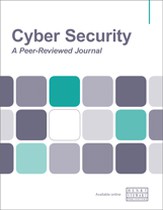Three approaches to foster organisational cohesion and reduce friction for cyber and security teams
Abstract
High-quality and engaged cyber and security teams are essential to the successful operation and continued growth of any modern organisation. Deficiency in funding, lack of executive leadership and support and internal friction, however, can often present challenges to efficient and effective cyber and security programmes, limiting the responsiveness and capabilities of an organisation’s defenders. Therefore, building internal support and permission to execute is critical to enabling these teams to operate as the high-performing functions they need to be. To help facilitate cyber and security teams in achieving their goals, this paper presents suggestions and best practices to foster high-level support, dialogue and engagement throughout the organisation. The authors draw on their work building connections across functions in a large global institution as well as their previous experiences within other financial services organisations to provide concrete actions teams can take to refocus on the fundamentals and deliver immense benefits.
The full article is available to subscribers to the journal.
Author's Biography
Elizabeth Wanic has served in multiple cyber security roles in the financial services sector covering industry and government intelligence sharing and partnerships, tactical and operational cyber threat intelligence, and integration with strategic intelligence and wider security functions. She has prior experience at the Federal Reserve, with roles focused on strategic and operational cyber threat intelligence, development of fusion capabilities, and assessment of cyber security threats, risks and mitigations. She also worked for the United Nations in New York and overseas peacekeeping operations, and as an educator in the US and Japan.
Bradley Smith has spent more than 15 years in financial services focused on anti-economic crimes and cyber security, including anti-fraud, cyber defence, anti-money laundering, sanctions, know your customer and anti-bribery and corruption programmes. As Head of the Cyber Fraud Fusion group of Barclays in the US, Brad is focused on protecting customers and clients through proactive, intelligence-driven actions that limit threat activity before it occurs. Prior to Barclays, Brad was a consulting leader at Deloitte, PwC and IBM.
